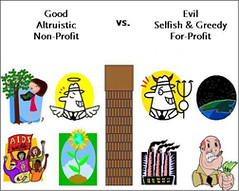According to the Core Values of Whole Foods Market, there is only one way to satisfy the needs of stakeholders. And that is to satisfy customers first.
Oh, make that two ways. According to The Associated Press (AP), John Mackey, CEO of Whole Foods Market Inc. (Whole Foods), found that posting under the anonymous name “rahodeb” was a pretty good way to satisfy the needs of stakeholders as well.
According to the story, Whole Foods announced it would buy Wild Oats for about $565 million, or $18.50 per share. But unfortunately, this comes after “rahodeb” posted the stock was overpriced; predicted the company would fall into bankruptcy; claimed it would be sold after its stock fell below $5 per share; declared Wild Oats' management "clearly doesn't know what it is doing;" and that the company "has no value and no future."
Obviously, “rahodeb” must have miswrote because Wild Oats does have value: $18.50 a share, which is sharply steeper the $5 per share that “rahodeb,” er, Mackey, um, "rahodeb" had hoped for as the masked Wild Oats stock vandal.
In fact, Wild Oats is so valued by Mackey, he has taken to misappropriating his company's public relations and social media communication to flame the Federal Trade Commission (FTC). Apparently, he is not happy they made his anonymous comments public in an attempt to block the merger nor does he accept that the FTC is trying to prevent the elimination of another competitor.
"As previously announced, we set an intention as a company to be as transparent as possible throughout this legal process, and this blog entry is my first detailed effort at transparency," said Mackey in a news release that neglects to reveal how posting anonymous comments on Internet financial forums for seven years might be transparent.
“I provide explanations of how I think the FTC, to date, has neglected to do its homework appropriately, especially given the statements made regarding prices, quality, and service levels in its complaint. I also provide a glimpse into the bullying tactics used against Whole Foods Market by this taxpayer-funded agency,” Mackey continues on his blog. “As stated in our initial press release about Whole Foods Market's challenge to the FTC's complaint, we set an intention as a company to be as transparent as possible throughout this process. This is my first detailed effort at transparency.”
Hmmm ... I suspect if there is any "whole truth" that could potentially win a fruit basket then “this is my first effort at transparency” must be it. Unfortunately, had Mackey done his homework, the best time to be transparent is before one damages personal credibility. So, what this all means is the happiness factor of Whole Foods (where I shop sometimes) is about to be spoiled.
How do I know? Well, some of the writing is already on the blog. Mackey, just days before this seven-year ethical breach came to light, published the graphic above for one of his more colorful, but long-winded posts, Conscious Capitalism: Creating a New Paradigm for Business. He says the image represents “a common view of the good, altruistic non-profit organizations versus the evil, selfish, greedy corporations.”
Overall, I don’t subscribe that the notion that this is really the "common view." It seems more likely to me that each company is charged with its own reputation management. And, with this responsibility, each is free to nurture positive public opinion in any it feels fit, starting with the behavior of its CEO.
But then again, if the "common view" is that corporations are “evil, selfish, and greedy,” it seems to me that any CEO who would attempt to drive down the stock prices of a competitor, under the veil of anonymity, certainly isn't helping this perception go away.
In sum, Mackey wants us to accept that there are truths, half-truths, and now “whole truths.” And while that might sound all fun and amusing (enough to start a living case study), the SEC isn’t laughing.

Oh, make that two ways. According to The Associated Press (AP), John Mackey, CEO of Whole Foods Market Inc. (Whole Foods), found that posting under the anonymous name “rahodeb” was a pretty good way to satisfy the needs of stakeholders as well.
According to the story, Whole Foods announced it would buy Wild Oats for about $565 million, or $18.50 per share. But unfortunately, this comes after “rahodeb” posted the stock was overpriced; predicted the company would fall into bankruptcy; claimed it would be sold after its stock fell below $5 per share; declared Wild Oats' management "clearly doesn't know what it is doing;" and that the company "has no value and no future."
Obviously, “rahodeb” must have miswrote because Wild Oats does have value: $18.50 a share, which is sharply steeper the $5 per share that “rahodeb,” er, Mackey, um, "rahodeb" had hoped for as the masked Wild Oats stock vandal.
In fact, Wild Oats is so valued by Mackey, he has taken to misappropriating his company's public relations and social media communication to flame the Federal Trade Commission (FTC). Apparently, he is not happy they made his anonymous comments public in an attempt to block the merger nor does he accept that the FTC is trying to prevent the elimination of another competitor.
"As previously announced, we set an intention as a company to be as transparent as possible throughout this legal process, and this blog entry is my first detailed effort at transparency," said Mackey in a news release that neglects to reveal how posting anonymous comments on Internet financial forums for seven years might be transparent.
“I provide explanations of how I think the FTC, to date, has neglected to do its homework appropriately, especially given the statements made regarding prices, quality, and service levels in its complaint. I also provide a glimpse into the bullying tactics used against Whole Foods Market by this taxpayer-funded agency,” Mackey continues on his blog. “As stated in our initial press release about Whole Foods Market's challenge to the FTC's complaint, we set an intention as a company to be as transparent as possible throughout this process. This is my first detailed effort at transparency.”
Hmmm ... I suspect if there is any "whole truth" that could potentially win a fruit basket then “this is my first effort at transparency” must be it. Unfortunately, had Mackey done his homework, the best time to be transparent is before one damages personal credibility. So, what this all means is the happiness factor of Whole Foods (where I shop sometimes) is about to be spoiled.
How do I know? Well, some of the writing is already on the blog. Mackey, just days before this seven-year ethical breach came to light, published the graphic above for one of his more colorful, but long-winded posts, Conscious Capitalism: Creating a New Paradigm for Business. He says the image represents “a common view of the good, altruistic non-profit organizations versus the evil, selfish, greedy corporations.”
Overall, I don’t subscribe that the notion that this is really the "common view." It seems more likely to me that each company is charged with its own reputation management. And, with this responsibility, each is free to nurture positive public opinion in any it feels fit, starting with the behavior of its CEO.
But then again, if the "common view" is that corporations are “evil, selfish, and greedy,” it seems to me that any CEO who would attempt to drive down the stock prices of a competitor, under the veil of anonymity, certainly isn't helping this perception go away.
In sum, Mackey wants us to accept that there are truths, half-truths, and now “whole truths.” And while that might sound all fun and amusing (enough to start a living case study), the SEC isn’t laughing.






















